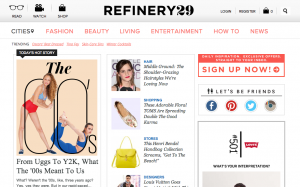When Josh Himwich, VP of Product for Refinery29, talks about tablet, he’s talking about iPad.
Why? 
Because in 2011, 98 percent of the tablet traffic to Refinery29 was from iPad, leaving only two percent for all other tablets. And because Refinery29’s iPad traffic has seen a 400 percent growth.
iPad is clearly working for Refinery29, a unique company in the e-commerce space, especially for Himwich. He came to the company from Quidsi, a massive online retailer bought by Amazon in 2010 for $550 million.
“I wanted to do something that was about the disovery of commerce instead of task-based commerce,” Himwich said during a presentation at eTail West 2013.
Refinery29 is, at its core, a media company, focused on fashion, design and lifestyle. Since Himwich joined it has begun to incorporate e-commerce through curated shopping experiences called R29 Shops. The initiative has proven successful, but Himwich sees it becoming even more so, soon.

Josh Himwich
Unlike Quidsi (owner of Soap.com, Wag.com, Casa.com), Refinery29 shoppers aren’t necessarily sure what they want. Perusal through the Refinery29 channels might lead them to it…to that purse they didn’t know they wanted but simply must have now that they’ve seen it and heard all about it from a group of very fashion-savvy editors who recommended it.
“Most of our models are staffers,” said Himwich. “It’s all about self expression – finding this true person inside of you.”
That’s the genius of R29 Shops – it is all about bringing the editors’ expert opinions (those same editors who wrote the article about Beyonce’s best hairstyles that your targeted customer just read) into the shopping experience.
Task-based commerce, on the other hand, is about leading your customer to exactly what they want quickly because they’ve come to you looking for it. (Example: shoppers go to Wag.com because they know they need pet supplies, or to Zappos.com because they know they need a pair of shoes and have bought them from Zappos before.)
Himwich says that when it comes to the alternative, or discovery-based commerce, tablet is the perfect medium. In order to exemplify his point, Himwich gave the example of a competitor to Refinery29, Fab.com. The company, which generated 1.8 million users in only nine months, discovered that of those people who signed up to the Fab.com site via iPad, 70 percent bought something. Conversely, only 12 percent of those who signed up for the website via a desktop actually bought something.
This “lean-back shopper” using the iPad is shopping from 8 p.m to midnight and although s/he has every one of his/her devices at his/her disposal, s/he chooses the iPad. Himwich says that’s because, for the first time at a mass level, shopping is becoming a form of entertainment – and tablet is what’s enabling that shift.
Of all the kinds of online shopping out there, entertainment-based is the only one that hasn’t really been mastered. Friends taking a trip to SoHo in NYC or down Rodeo Drive are going shopping for fun. They may or may not buy something, but the act of shopping is entertainment. That kind of shopping hasn’t been figured out online yet, said Himwich.
His belief is that one of the things killing the possibility of this concept’s success is abstraction. If customers can’t figure things out quickly, they’ll leave. We need to deliver simplicity, and the iPad is a great way to do that.
Himwich pointed out in his presentation that, “When asked if the iPad would have a stylus, Steve Jobs said, No, God gave us 10 styluses.”
What has really driven tablet is that it is image based and that it encourages users to physically touch a product. It makes sense that even a two-year old can understand its functionality.
Looking back at Fab.com, Himwich explained how the company’s iPad app defies all conventions and everything retailers might think is a good practice for designing an iPad app, yet it does phenomenally well and is extremely well-received and reviewed. The app focuses almost entirely on big images – removing any abstraction around the product and just simply presenting it.
In conclusion, Himwich advised retailers to keep in mind that:
– iPad shoppers are online 8-12 midnight
– Shopping as entertainment will be a growing challenge and trend
– Whenever/wherever possible, remove abstraction
– Focus on images




Recent Comments